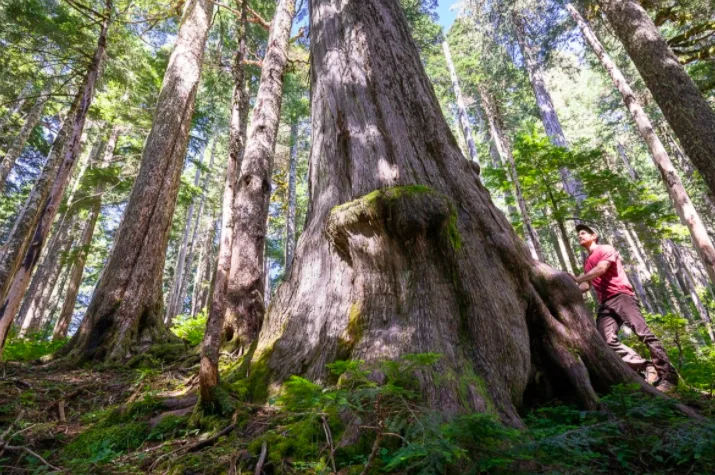
Unchecked industrial logging in B.C. could increase climate change disasters
A report commissioned by Sierra Club B.C. says keeping healthy, mature forests safe from industrial logging will help protect the province from catastrophic flooding, wildfires, droughts and heat waves caused by climate change.
The report, released publicly Monday morning and authored by Peter Wood, who holds a PhD in Forestry at the University of Toronto, is the latest push from conservationists to spur the province into swift action in providing increased protection for what remains of B.C.'s biodiverse forests.
"Old intact forests act as a moderating influence on the landscape, supporting ecosystem function and resilience, and lowering risk to surrounding communities," Wood said in a release from Sierra Club B.C.
Wood has built a career working on the impacts of sustainable forest management certification in Canada.
His report, entitled Intact Forests, Safe Communities, says at least nine of 15 climate risks assessed by the province in 2019 — such as increased wildfires, drought and landslides — are influenced by industrial logging.

An aerial photograph of the Nahmint Valley outside Port Alberni, B.C., shows protected old growth groves along the water and replanted hillsides that were previously logged. (Chris Corday/CBC)
It says the province has not considered the ways that logging could worsen catastrophic events from climate change, presenting "a major blind spot that could undermine the effectiveness of the province's response to global heating."
According to the report, forests with large old trees have dense canopies, thick tough bark, extensive roots systems and space between them, which helps prevent the spread of forest fires, landslides, and flooding — along with protecting water sources.
It also says that dead branches and slash materials left in clear-cuts with no canopy can act as fuel for wildfires and that second-growth forests aren't as resilient against wildfires due to the thinner bark on trees and proximity to one another.
"B.C. has entered a new era of climate emergency that is marked by risks to communities, and forest management must be adapted to mitigate these," says the report.

An infographic created by Sierra Club B.C. for its Intact Forests, Safe Communities report, which says intact forests can help mitigate the consequences of climate change. (Mya Van Woudenberg/Sierra Club BC)
The province is in the middle of a process to better understand climate-related risks in B.C. and develop appropriate measures to address them.
The Preliminary Strategic Climate Risk Assessment for British Columbia has few mentions of logging in it, other than to say the industry, which accounts for around $9 billion in annual revenue, could face significant losses due to climate change.
The province is considering changes to how logging is done following an independent report released in September that outlined 14 recommendations, including short- to long-term goals for revitalizing the forestry sector involving old growth trees over a 36-month timeline.
The new report from the Sierra Club of B.C. calls for the province to move faster in meeting those recommendations, including working in lock-step with First Nations to overhaul forest management, which it says will address the climate risks from logging.
Grand Chief Stewart Phillip, president of the Union of B.C. Indian Chiefs, supports the findings in the Sierra Club report.
He said in a statement that the climate crisis impacts all British Columbians, but particularly marginalized people, including First Nations, who may have few resources to respond to climate disasters.

An old growth area logged by Mosaic Forest Management on Mt. Horne, the hillside above the world-famous Cathedral Grove. Second-growth forests are in the foreground. (TJ Watt/Ancient Forest Alliance)
The union is also calling on the province to move quickly to implement the 14 recommendations from the old growth strategic review, which include involving Indigenous people in decisions related to forestry management.
"As they not only have a vested interest in protecting and stewarding the land that they have maintained spiritual and cultural ties to since time immemorial, but many Nations depend on forestry for their livelihoods and must be able to help guide B.C.'s transition to more sustainable and conservation-based practices," he said.
The Ministry of Forests, Lands, Natural Resource Operations and Rural Development said in a statement it welcomes the report and is considering its findings.
It said the province is focused on science-based reforestation to ensure sustainable forest management and address climate change. The ministry said 300 million trees were planted in 2020 and it plans to plant 300 million this year.
The ministry also said it is working with First Nations, industry stakeholders and communities "to ensure practices and management in B.C.'s forest sector continue to evolve and reflect the values British Columbians hold today and what they want for the future."
March 11 will mark six months since the old growth strategic review was released and the province deferred the logging of old growth trees for two years in nine different areas across the province as a first step.
Thumbnail credit: TJ Watt
This article was originally published by CBC News and written by Chad Pawson.











